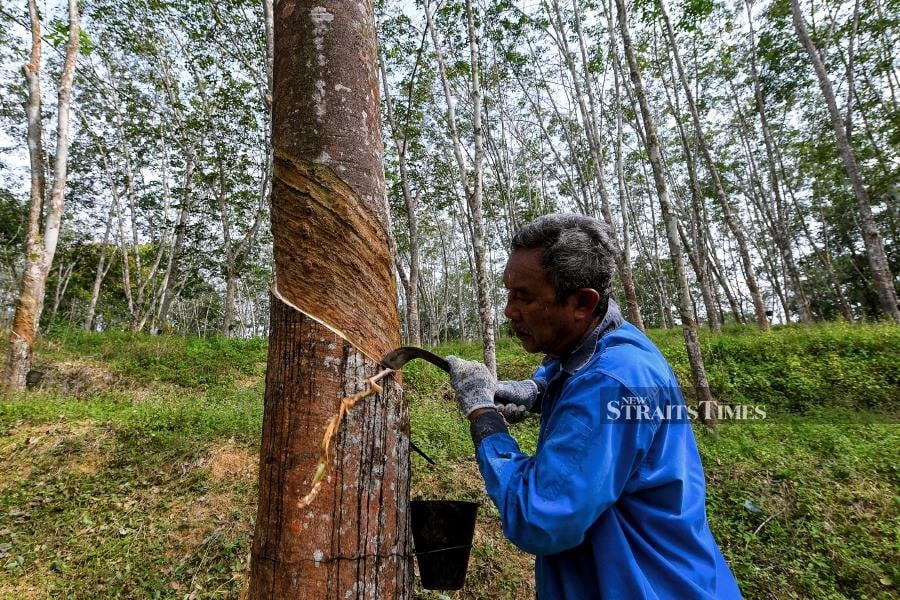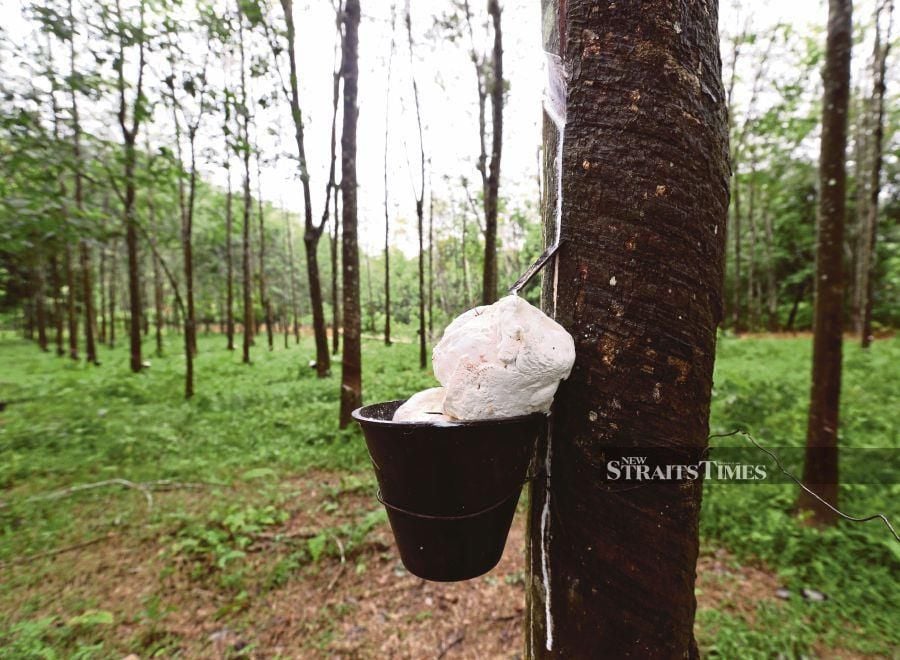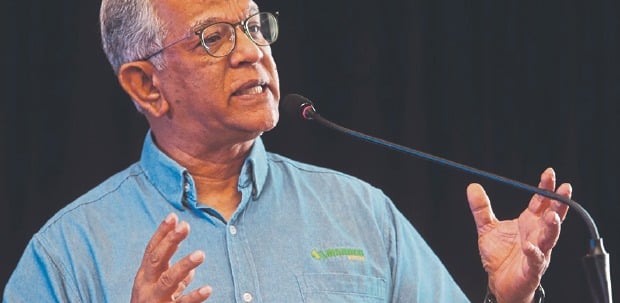BANGI: Malaysia's rubber industry, a cornerstone of sustainable agriculture, faces challenges that demand immediate government intervention, say economic analysts and industry leaders.
With calls for a comprehensive strategy encompassing policy reforms, technological innovation, and support for smallholders, experts emphasise the need for swift action to secure the industry's future.
Economic analyst Dr Zulkufli Zakaria said Malaysia's rubber industry, long regarded as a vital component of the country's agricultural landscape, was at a crossroads.
He stressed the urgency for government intervention, particularly in supporting smallholders within the industry.
He suggested that the Rubber Industry Smallholders Development Authority (Risda) should play a more significant role in the pursuit of lucrative ventures.
"This involvement should extend to joint ventures, particularly in exclusive markets such as aircraft tyre manufacturing, which can contribute to higher income levels," he told the 'Business Times' at the National Direction Seminar for Rubber Industry Smallholders recently.
Zulkufli stressed the importance of Risda's active participation in international trade fairs, asserting that such an engagement would facilitate the growth of high-impact manufacturing ventures.
He said by assisting companies in reaching global markets, the government could generate substantial returns, benefiting not only those directly involved but also smallholders and the overall national gross domestic product.
Zulkufli added that the government's role in shaping the rubber industry was critical and required a revamp of existing policies.
He highlighted the need for streamlining bureaucratic processes, embracing digitalisation, and leveraging online platforms for efficient decision-making.
"Embracing robotics and artificial intelligence is also crucial, especially given the demographic shift towards an ageing population."
To address the potential labour shortages, Zulkufli suggested facilitating the importation of skilled manpower.
However, he noted that a cultural shift towards embracing technological advancements was essential for successful implementation.
He also advocated for a positive mindset, drawing parallels with transformative experiences in China, South Korea and Taiwan.
Despite commendable efforts, Zulkufli said the government's support for smallholders appeared insufficient.
He recommended a strategic shift, focusing on the assets within the smallholder community.
He said by incentivising young graduates with engineering backgrounds to drive electronics and mechatronic innovation, the government could tap new opportunities.
The government, said Zulkufli, should transition from digitalisation to actively promoting innovation.
"This involves collaborative efforts that bring together various entities to form a united front against global competition.
"Allocating more funding for startup companies, exploring crowdfunding and adopting a systematic approach to funding are crucial steps towards empowering the new generation in the rubber industry," he added.
Meanwhile, Universiti Putra Malaysia lecturer Professor Dr Norsida Man said rubber plantation and production was an important aspect of sustainable agriculture in Malaysia, and provided numerous benefits to farmers and industries alike, including a source of income and raw materials for various products.
However, she said it was also important to note that there were challenges faced by rubber tree farmers, such as pests and diseases, market fluctuations and competition from other crops.
"But despite these challenges, the industry has remained resilient due to its high profitability and demand for rubber-based products in both the local and international markets.
"With proper management practices such as intercropping with other crops, regular monitoring for pests and diseases, and utilisation of modern processing technologies, rubber tree farming can continue to thrive in Malaysia."
Norsida said it was also essential to recognise the value of rubber trees not only as a source of income but also as a vital component in promoting environmental sustainability through reforestation efforts.
She said by supporting this industry through smart investments in technology innovation or policy changes, rubber tree farmers would have access to better resources while providing quality products at competitive prices without compromising on social or environmental values.
National Association of Smallholders of Malaysia (NASH) chief information officer Amran Jaafar emphasised the critical need to address challenges faced by rubber smallholders, particularly in light of the persistent low and disproportionate rubber prices.
He pointed out that the benchmark income for small-scale farmers, set at RM1,500 per hectare per month, posed a considerable challenge.
He said a simulation of income based on rubber production and market prices revealed that the monthly income fell short of the targeted Risda standard, raising concerns about the financial sustainability of small-scale rubber farmers.
"The prevailing problem of low and disproportionate rubber prices is a significant hurdle for our small rubber plantation farmers. We need to address this issue urgently to ensure the economic viability of this vital sector."
The overarching issue in the rubber industry, as highlighted by Amran, revolves around the determination of prices.
He said two key factors influencing rubber prices were the stock held by rubber-importing countries such as China, and the pricing mechanism set by the Risda and the international market.
According to Amran, the current price determination mechanism leaned heavily towards the consumer market, neglecting a specific price representing the upstream industry, i.e., smallholders.
In response to these challenges, he said smallholders were urged to take proactive steps, including increasing productivity through tapping and latex stimulation.†
He said additional measures involved fertilising, stimulation and collective sales to enhance the economic viability.
Furthermore, he also said Risda played a pivotal role in these initiatives and, thus, should be actively involved in the economic, social, and skill development of smallholders.
It can help establish connections with government agencies and participate in strategic collaborations at the national and international levels.
Overall, Amran said urgent action was needed to strengthen Risda as a "bridge" between smallholders and the government, as well as with other associations in the rubber industry.
He added that addressing the pricing mechanism and enhancing support for smallholders were essential steps to ensure the sustainability of Malaysia's rubber industry.
On the other hand, Risda deputy director-general (development) Ahmad Zainal Abdullah highlighted the myriad challenges faced by the rubber production industry in the country.
He said these challenges included low rubber prices, rising production costs, ageing plantation owners and difficulties in securing tapping labour.
Additionally, he said the outbreak of the Pestalotiopsis disease since 2018 significantly reduced yields while the younger generation showed little interest in leading the national rubber industry.
Acknowledging these challenges, Ahmad Zainal outlined Risda's ambitious plan to revitalise smallholder rubber production.
He noted that the production targets were set at 460,000 tonnes per year in 2020, with a progressive increase to 700,000 tonnes in 2025 and 900,000 tonnes in 2030.
He said in the face of unpredictable weather changes, competition from other rubber-producing nations and a reduction in plantation areas due to development, Risda's comprehensive approach aimed to fortify the resilience and growth of the smallholders.
Ahmad Zainal said Risda's strategic initiative, "Jom Menoreh Getah", focused on various aspects, including replanting aid, rejuvenation of inactive rubber estates, group replanting projects for mature estates, and participation in the Mature Rubber Scheme.
He also emphasised the importance of incorporating activities such as weeding, fertilising mature rubber trees, using stimulation materials, perfecting tapping techniques, promoting latex production, shortening the marketing chain, and participating in Risda marketing programmes.
"The target for 2024 under this strategy is 313 tapping campaign events involving 10,950 smallholder participants," he added.








